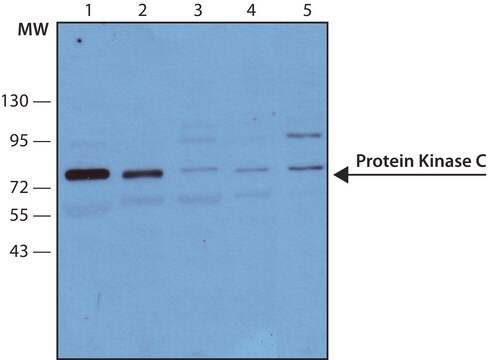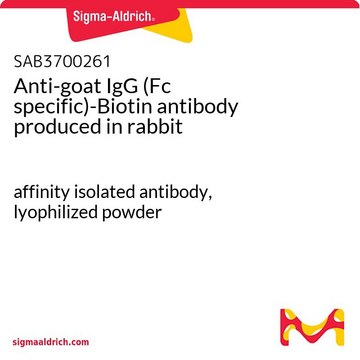SAB4200739
Anti-Protein kinase C antibody, Mouse monoclonal
clone MC5, purified from hybridoma cell culture
Sinônimo(s):
Anti-PKC
About This Item
Produtos recomendados
fonte biológica
mouse
Nível de qualidade
forma do anticorpo
purified from hybridoma cell culture
tipo de produto de anticorpo
primary antibodies
clone
MC5, monoclonal
Formulário
buffered aqueous solution
peso molecular
antigen ~80 kDa
reatividade de espécies
chicken, human, fish, mouse, bovine, rabbit, rat
concentração
~1.0 mg/mL
técnica(s)
immunoblotting: 1.25-2.5 μg/mL using human bone marrow neuroblast SH-SY5Y cell extract
immunocytochemistry: suitable
immunofluorescence: suitable
immunoprecipitation (IP): suitable
Isotipo
IgG2a
nº de adesão UniProt
Condições de expedição
dry ice
temperatura de armazenamento
−20°C
modificação pós-traducional do alvo
unmodified
Informações sobre genes
human ... PRKCA(5578)
Descrição geral
Especificidade
Aplicação
- immunoblotting
- immunohistochemistry
- immunofluorescence
- immunoprecipitation
Ações bioquímicas/fisiológicas
forma física
Armazenamento e estabilidade
Exoneração de responsabilidade
Não está encontrando o produto certo?
Experimente o nosso Ferramenta de seleção de produtos.
Código de classe de armazenamento
10 - Combustible liquids
Ponto de fulgor (°F)
Not applicable
Ponto de fulgor (°C)
Not applicable
Escolha uma das versões mais recentes:
Certificados de análise (COA)
Não está vendo a versão correta?
Se precisar de uma versão específica, você pode procurar um certificado específico pelo número do lote ou da remessa.
Já possui este produto?
Encontre a documentação dos produtos que você adquiriu recentemente na biblioteca de documentos.
Nossa equipe de cientistas tem experiência em todas as áreas de pesquisa, incluindo Life Sciences, ciência de materiais, síntese química, cromatografia, química analítica e muitas outras.
Entre em contato com a assistência técnica








